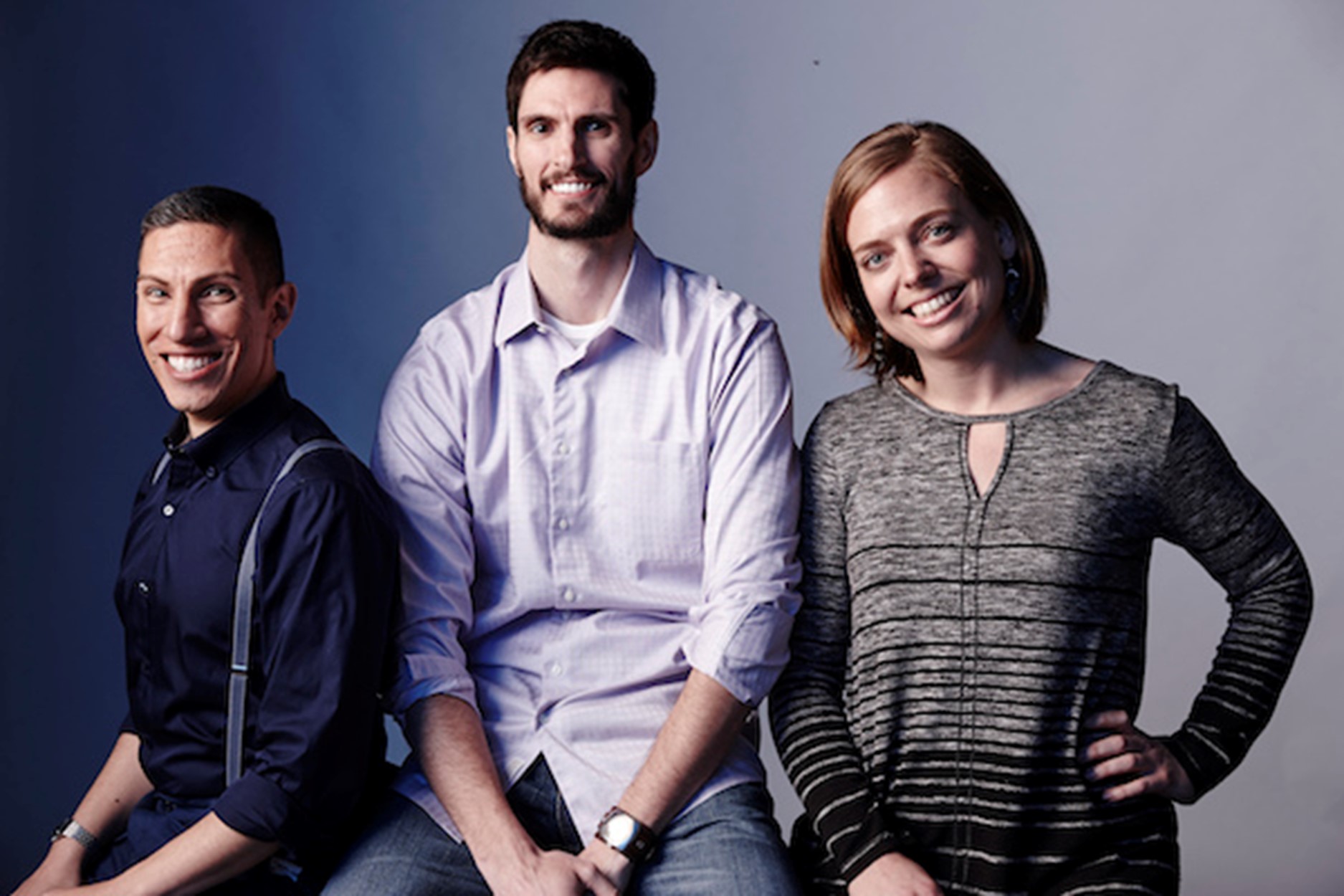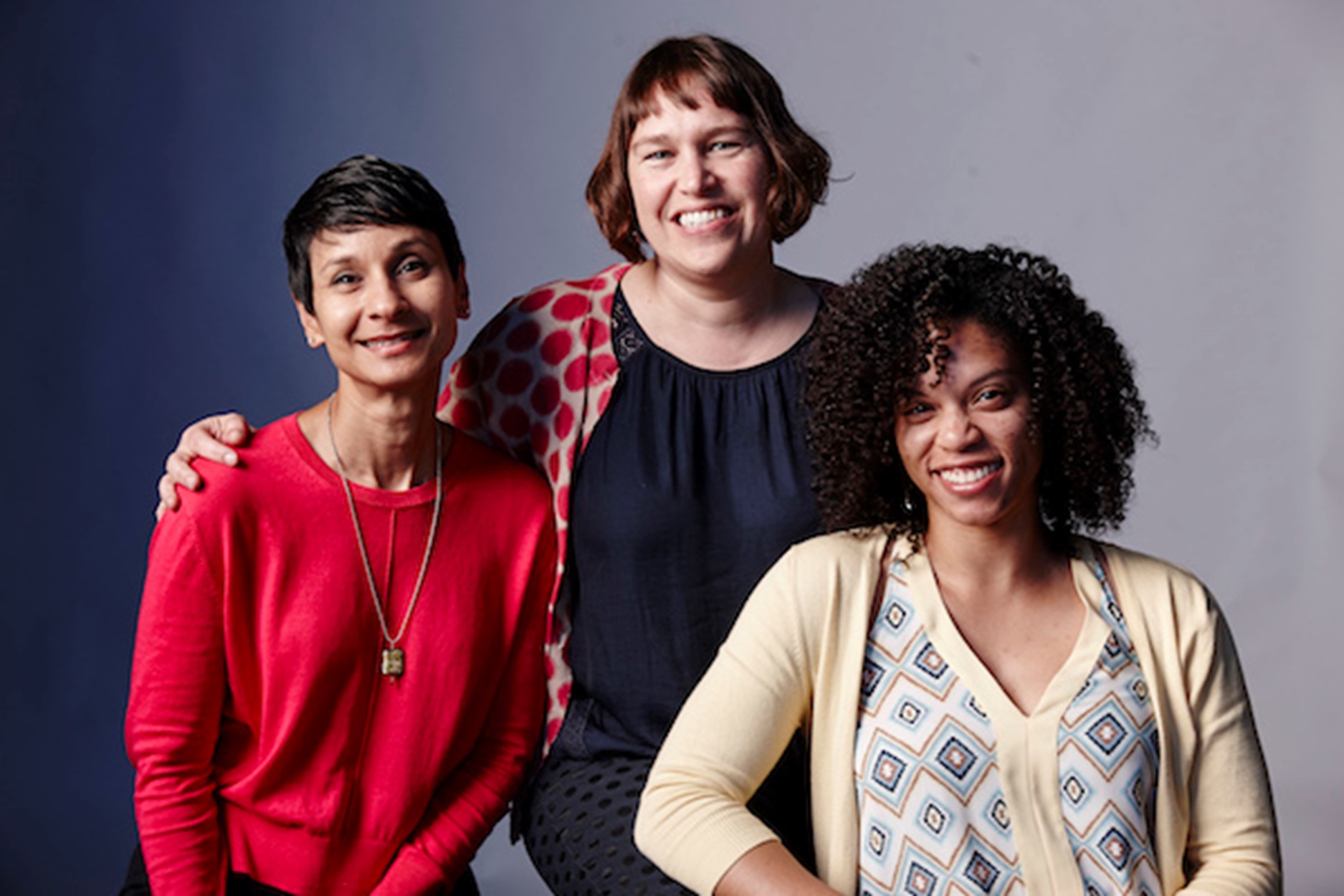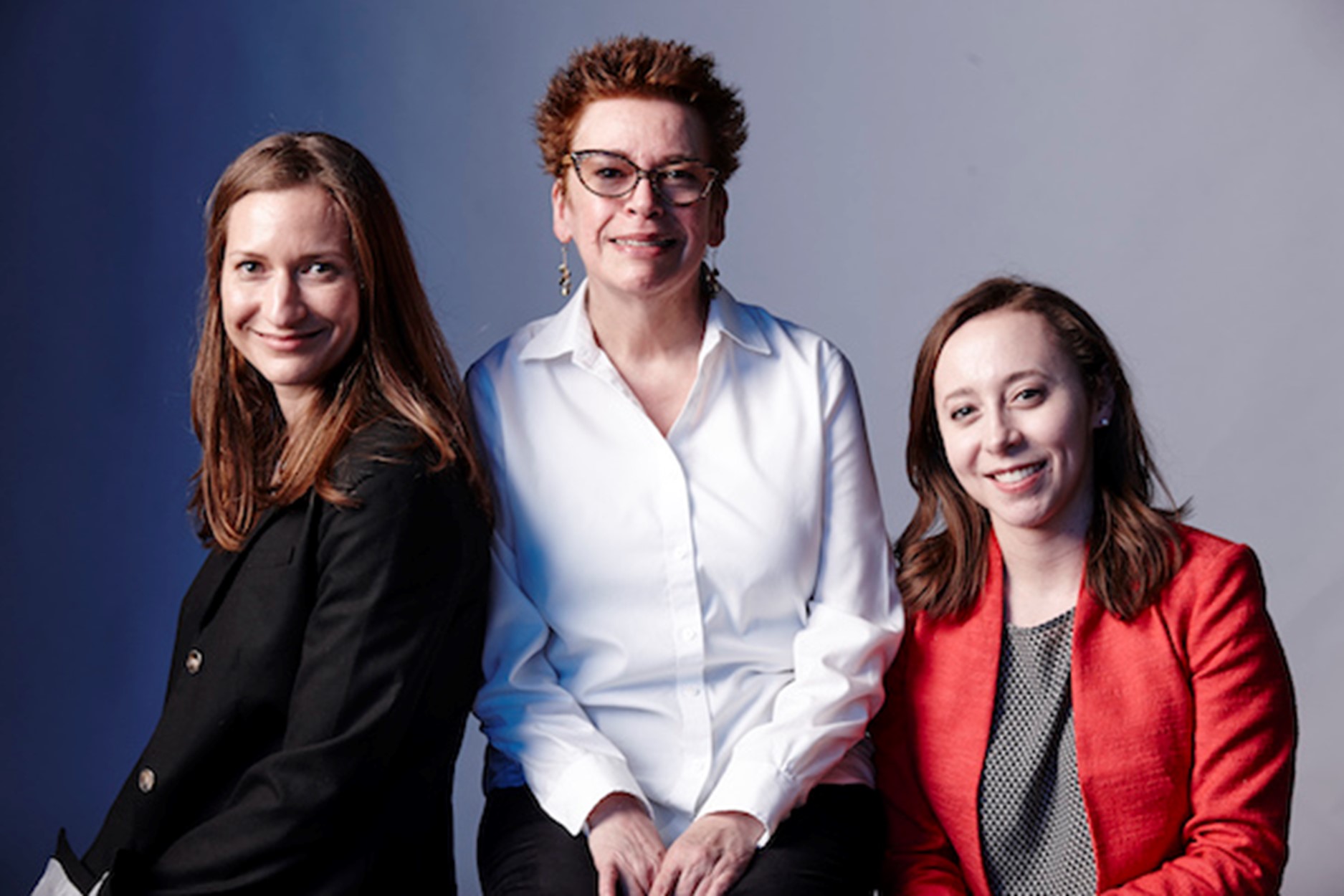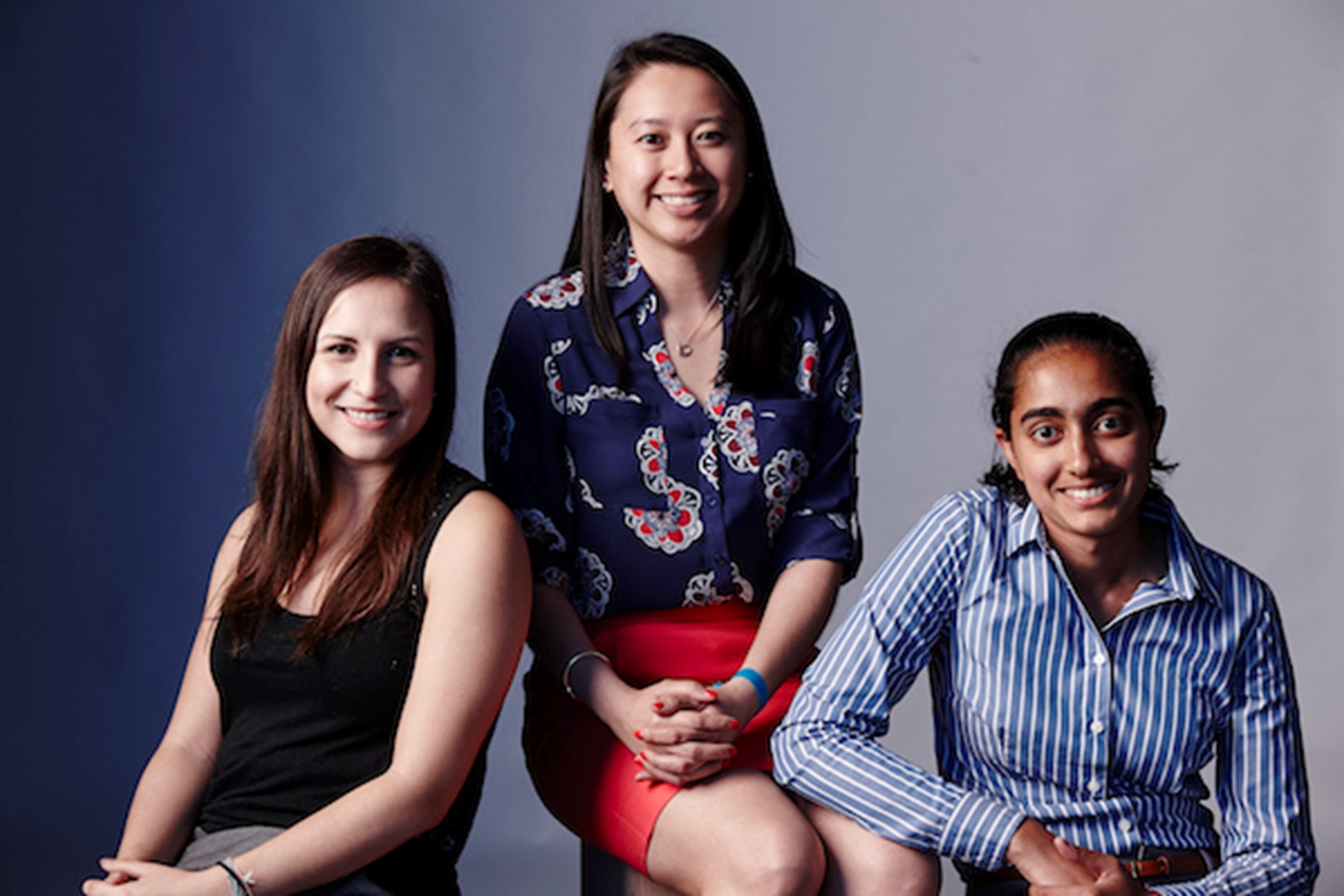Meet the Innovators: First Cohort
From April to August 2016, Power to Decide and our partner, renowned design firm IDEO, supported 10 winning teams from our inaugural round of Innovation Next funding as they used human-centered design to develop technology-based products and services to reduce teen pregnancy. In August, the 10 teams presented their ideas in a "Shark Tank" style pitch competition in front of a panel of judges.
We present the five winners from that pitch competition. These projects were chosen to receive up to $325,000 to develop their innovative technology interventions over 18 months, from August 2016 to June 2018.
Project Name: OkaySo

The Original Team: Francisco Ramirez (Sexual health expert and personality), Will Luxion (CTO, Playerbase), and Amelia Holstrom (Planned Parenthood)
The Current Team: Francisco Ramirez (Sexual health expert and personality) and Elise Schuster (CEO, okayso)
How Might We meet teens where they are to answer their questions about sex, love, relationships, and stress in an anonymous way?
Description: OkaySo is working to advance their original mission: to meet teens looking for support and information where they are. OkaySo is a free mobile app that connects young people with questions about sex, dating, identity, stress, and more to teams of vetted experts who answer their questions wherever and whenever they need it. After being featured on the Apple App Store three times and answering over 11,000 questions from young people across the country, the team is currently seeking to expand their funding and their platform. OkaySo is partnering with nonprofits, colleges, and health departments to enhance their direct service capacity. OkaySo hopes to build out their platform to further engage users, whether or not they have a question to ask. Their most enthusiastic users are age 16-22 and live in the United States and Canada.
Check it out:
Project Name: Starting the Conversation: Leveraging EHR Templates to Help Reluctant Providers Talk to their Adolescent Patients About Sexuality and Pregnancy Prevention

The Original Team: Dannelle Pietersz (Family Planning Clinical Programs Manager, Los Angeles County Department of Health Services), Amber Eisenmann (Director, Learning Exchange, Essential Access Health), and Breione St. Claire (Project Director, Essential Access Health)
The Current Team: Amber Eisenmann (Director, Learning Exchange, Essential Access Health), Breione St. Claire (Project Director, Essential Access Health), and Karen Peacock (Associate Vice President of Research + Evaluation, Essential Access Health)
How Might We use electronic health records to help health care providers have more meaningful conversations with their patients about sexuality and pregnancy intention?
Description: This team sees a future where electronic health records (EHR) are used for more than just collecting data. They wonder how EHR scripts and prompts might equip providers with the language they need to talk to their teen patients about sexuality and pregnancy prevention, to identify their needs and preferences, to prescribe contraception when needed, and to suggest resources. They believe new EHR templates, which can eventually be integrated into systems nationwide, will help providers, “‘fake it till they make it,’ acting as training wheels to get them started in their efforts to discuss these topics.” They are currently pilot testing this technology in two health centers in Los Angeles, CA.
Project Name: Momentos: Empowering Hispanic/Latino Parents to Talk to Their Kids About Pregnancy Prevention

The Original Team: Laura Lourenco (Senior Project Manager, Westat), Eliana Loveluck (Senior Health Communications Specialist, Westat), and Julie Yegen (Senior Digital Media Associate, Westat)
The Current Team: Julie Yegen (Senior Digital Media Associate, Westat) and Sarah Paredes (Health Communications Specialist, Westat)
How Might We leverage digital media to give Hispanic/Latino parents the skills and tools needed to effectively talk to their kids about pregnancy prevention?
Description: The Momentos team is passionate about creating tools and messages that empower Hispanic/Latinx parents to have better conversations with the youth in their lives. They used interviews with Hispanic/Latinx parents and professionals to create, test, and refine what is now, Momentos, a Spanish-language text messaging service that provides weekly, practical advice to parents. The texts are customizable based on the age and gender of the children and guide parents through teaching about sexual health and preventing unplanned pregnancies.
The best part about Momentos is that it works—91% of parents enrolled in Momentos used content to initiate conversations about sexual health with their children. The Momentos team hopes to secure more funding to continue the program and expand it by creating more original resources.
Project Name: An Instant Gratification Situation

The Original Team: Lauren Butts (Sprocket Communications), Liz Romer (Children's Hospital Colorado), and Stephanie Begun (University of Denver Graduate School of Social Work)
How Might We connect with teens who can’t, won’t or simply don’t seek contraceptive services through available resources, clinics, and schools?
Description: In order to reach teens who are not currently seeking birth control services, the trio behind An Instant Gratification Situation wants to create content, stories, resources, and messaging that fits into the lives of today's teen. Building on the success they have had developing content for their previous program, BC4U, they have a particular interest in creating more content to distribute in the social media channels where teens are active today. They are convinced that creating a very personal way to make appointments with providers—even asking questions beforehand—can make a difference in helping young people get reproductive health care.
Project Name: Real Talk

The Original Team: Cristina Leos (Doctoral Student, UNC Gillings School of Global Public Health), Liz Chen (Doctoral Student, UNC Gillings School of Global Public Health), and Vichi Jagannathan (MBA candidate, Yale School of Management)
The Current Team: Cristina Leos (CEO, MyHealthEd, Inc.)
How Might We use technology to create a program that individualizes sex education for different groups of students in order to reduce disparities in sexual health outcomes?
Description: In 2016, the team founded a new tech nonprofit called MyHealthEd, Inc. Their mission is to use human-centered design to improve the health and well-being of youth of every identity. They launched the first version of the Real Talk app in the iOS App Store in September 2017 and have had over 10,000 users to date from all US states and more than 100 countries. Real Talk is a mobile app that connects teens with authentic stories and trusted resources on sensitive topics to help them know they are not alone. Real Talk crowdsources anonymous stories from teens on important topics such as puberty, mental health, bullying, and healthy relationships. These stories are carefully reviewed by public health professionals and paired with high-quality online resources before being published to the app. Teens can search for topics that are most relevant to them and support other users in the app using positive emoji reactions. Teens can also submit their own stories directly within the app using a new interactive chatbot features that guides teens through the storytelling process. Since its launch, 24,000 users have read over 100,000 stories and accessed more than 5,000 online health resources!
Check it out:
Below are the five teams that participated in the pitch competition but were not selected to move forward.
Project Name: The It Kit
The Team: Margot Mausner (Producer, ISL), Maggie Gaudaen (Art Director, ISL) and Julian Gindi (Lead Infrastructure Engineer, ISL)
How Might We reduce the rate of teen pregnancy prevention by providing teens with the knowledge and supplies to lead healthy, sex positive lives?
Description: The It Kit Team wondered, “How might we reduce the rate of teen pregnancy by providing teens with the knowledge and supplies to lead healthy, sex-positive lives?” The team explored the idea of a subscription service—think Birchbox or Trunk Club for birth control—that would make it fun and tactile to learn about safe sex.
Project Name: Love Life Rules
The Team: Cindy Carraway-Wilson (Director of Training, Youth Catalytics), Sixto M. Cancel (CEO, Think of Us), and Somiah Lattimore (Chief Creative Officer, Think of Us)
How Might We reduce pregnancies and STIs in youth in, or formerly in, foster care by helping them articulate, set, and adhere to personal rules for healthy romantic relationships?
Description: The goal of the Love Life Rules Team project was to reduce pregnancies and STIs in youth in, or formerly in, foster care by helping them articulate, set, and adhere to personal rules for healthy romantic relationships. The team explored the development of a comprehensive, interactive, sequential self-coaching experience for web and mobile applications that would help foster care youth gain concrete, practical knowledge about dating, healthy vs. unhealthy relationships, and sexuality (including pregnancy and STI prevention).
Project Name: Don’t Make It Weird
The Team: Susan E. Williams (Founder and Lead Principal, Agency Other), Becky Reitzes (Consultant in Public Health, Family Planning and Sexual Health Education), and Annie Hoopes (Assistant Professor of Pediatrics in the Adolescent Medicine Section, University of Colorado Denver School of Medicine)
How Might We catalyze parents, guardians, and other supportive adults to promote positive sexual health among young people and reduce teen pregnancy?
Description: The team was interested in the potential to connect parents to timely, modern resources and tools that optimize their ability to support the sexual and reproductive health needs of children and adolescents.
Project Name: Juntos
The Team: Helen Hua Wang (Assistant Professor of Communication; Research Assistant Professor of Community Heath and Health Behavior, State University of New York), Hector Ceballos (Manager, Research and Development, Wise Entertainment), and Laura Davis (Division Director of Adolescent Sexual Health Services, Advocates for Youth)
How Might We engage Latino tweens and teens, along with important people in their social networks, to co-create a sustainable platform to share compelling stories, build critical skills, and take real actions to promote their sexual and reproductive health?
Description: The Juntos Team wanted to include the person’s social surroundings in delivering sexual health information. They wanted to employ what could be called the “East Los High Method” as all team members have experience with that hit show and understand the value of storytelling and modeling to change behavior.
Project Name: VizClinic: First person exploration virtual reality game
The Team: Bhupendra Sheoran (Executive Director, YTH), Alex Medina (Digital Communications Officer, YTH) and Vianey Twyford (Youth Advisory Board Member, YTH)
How Might We revolutionize the way youth experience accessing sexual health services and increase service utilization by reducing the fear and uncertainty associated with visiting reproductive health clinics and services?
Description: The VizClinic team wanted to revolutionize the way young people experience the delivery of sexual health services. They saw an existing gap between service availability and utilization, and attributed at least some of it to the fear and anxiety teens have about what to expect during a clinic visit. They proposed bringing the clinic to the teens through a first-person virtual reality game. They hypothesized that an immersive experience where teens can visit a clinic, ask questions, and advocate for themselves would increase youth’s self-efficacy and empowerment, allowing them to access services with confidence.



